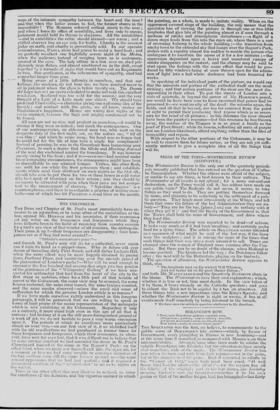SIGNS OF THE TIMES—WESTMINSTER REVIEW (REDIVIVUS.)
THE Westminster Review is the only one of the quarterly periodicals recently published that has entered on the question of Catholic Emancipation. Whether the others were afraid of the subject, or unable to say any thing, is best known to their authors. The Westminster at all events is not afraid; for a more out-and-out
declaration, as the Fancy would call it, has seldom been made on any public topic.* The Radicals do not mean, it seems, to take things as they used to do. They are putting themselves forward by name, and claiming to be somebody in the settlement of a public question. They laugh most irreverently at the Whigs, and tell them that since the failure of the last Administration they are nobody—" They cry for the toy, {place, I and can do nothing with it when they get it ;" and that the theory of the Government is, that the Tories shall hold the reins of Government, and drive where they least like.
The Westminster Review was reported to be dead—of schism.
It looks very much as if it had been moulting, ; and certainly pecks hard for a dying thing. The article on BERANGER seems intended as a specimen of what might be said of the last war, if the lions were the sculptors ; and it is among the signs of the times that such things find their way into a work intended to sell. Times are changed since the women of England were running after the Cossacks. But there can be no doubt of the change, when Holland is become poetical. The Quakers led the way ; the Dutchmen follow after ; the next will be the Hottentots, playing on the timbrels. The question of Absentees, the Westminster Review appears to think, was " The longitude mist on By wicked Will VI iston, And not better hit on By good Master Ditton ;" and both Mr. MACCULLOCH and the Quarterly Reviewers share in the blame. The Westminsters have their own explanation; which, whether it is true or not, time must decide. In the view taken of it by them, it bears strongly on the Catholic question ; and goes to exhort the Irish not to be cajoled by a tax on absentees. All these things take a new importance since the King's Speech; and whether the Westminster Review is right or wrong, it has at all events made itself somebody by being foremost in the breach.
* We have seen the article in question attributed to Dlr. Bentham.


















 Previous page
Previous page